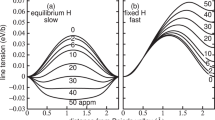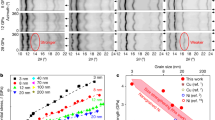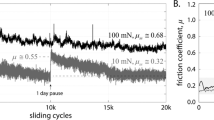Abstract
ON the basis of both theoretical considerations and experimental evidence it is usually recognized that oxide scales formed on metals are under stress. It is reasonable to assume that these scales will deform plastically, at least to some extent, at the elevated temperatures relevant to many thermal oxidation studies. In fact, few results of mechanical property measurements of scales formed by thermal oxidation have been reported, and most of these have been concerned with strength measurements on copper oxides1 and iron oxides2,3, although some creep data for iron oxides are available4. The mechanical properties of nickel oxide scales have recently been assessed5 and probably the most interesting observation was that NiO deformed plastically at 850° C (0.51 Tm), in contrast with the early observations of Tylecote2, who reported no significant plasticity even at 1,100° C. It was also shown that the behaviour of the creep deformation was strongly dependent on impurity level, the secondary linear creep rate being considerably greater for high purity oxide than for an oxide derived from relatively low purity nickel.
This is a preview of subscription content, access via your institution
Access options
Subscribe to this journal
Receive 51 print issues and online access
$199.00 per year
only $3.90 per issue
Buy this article
- Purchase on Springer Link
- Instant access to full article PDF
Prices may be subject to local taxes which are calculated during checkout
Similar content being viewed by others
References
Tylecote, R. F., J. Inst. Metals, 78, 301 (1950).
Tylecote, R. F., J. Iron Steel Inst., 196, 135 (1960).
Vagnard, J., and Manenc, J., Mem. Sci. Rev. Met., 62, 251 (1965).
Mackenzie, J. D., and Birchenall, C. E., Corrosion, 13, 783 (1957).
Menzies, I. A., and Strafford, K. N., J. Mat. Science, 2, 358 (1967).
Pettit, F. S., J. Electrochem. Soc., 113 (12) 1249 (1966).
Hirthe, W. M., and Brittain, J. O., J. Amer. Ceram. Soc., 46, 411 (1963).
Ashbee, K. H. G., and Smallman, R. E., Proc. Roy. Soc., A, 274, 195 (1963).
Scott, R., et al., J. Nucl. Mater., 1, 39 (1959).
Reppich, B., Phys. Stat. Sol., 20 (1) 68 (1967).
Douglass, D. L., Corr. Sci., 5, 255 (1965).
Fisher, B., and Tannhauser, D. S., J. Electrochem. Soc., 111, 1194 (1964).
Wood, G. C., et al., Corr. Sci., 5, 645 (1965).
Barmore, W. L., and Wandervoort, R. E., J. Amer. Ceram. Soc., 48, 499 (1965).
Wachtman, J. B., Amer. Ceram. Soc. Bull., 46, 756 (1967).
Author information
Authors and Affiliations
Rights and permissions
About this article
Cite this article
STRAFFORD, K., GARTSIDE, H. Effect of Stoichiometry on the Plastic Deformation Behaviour of Cobalt Monoxide Scales. Nature 220, 158–159 (1968). https://doi.org/10.1038/220158a0
Received:
Revised:
Issue Date:
DOI: https://doi.org/10.1038/220158a0
This article is cited by
-
Effect of creep on the oxidation characteristics of Fe-Si alloys at 973?1073 K
Oxidation of Metals (1982)
-
The creep of CoO scales ? the influence of stoichiometry, stress and temperature
Journal of Materials Science (1969)
Comments
By submitting a comment you agree to abide by our Terms and Community Guidelines. If you find something abusive or that does not comply with our terms or guidelines please flag it as inappropriate.



